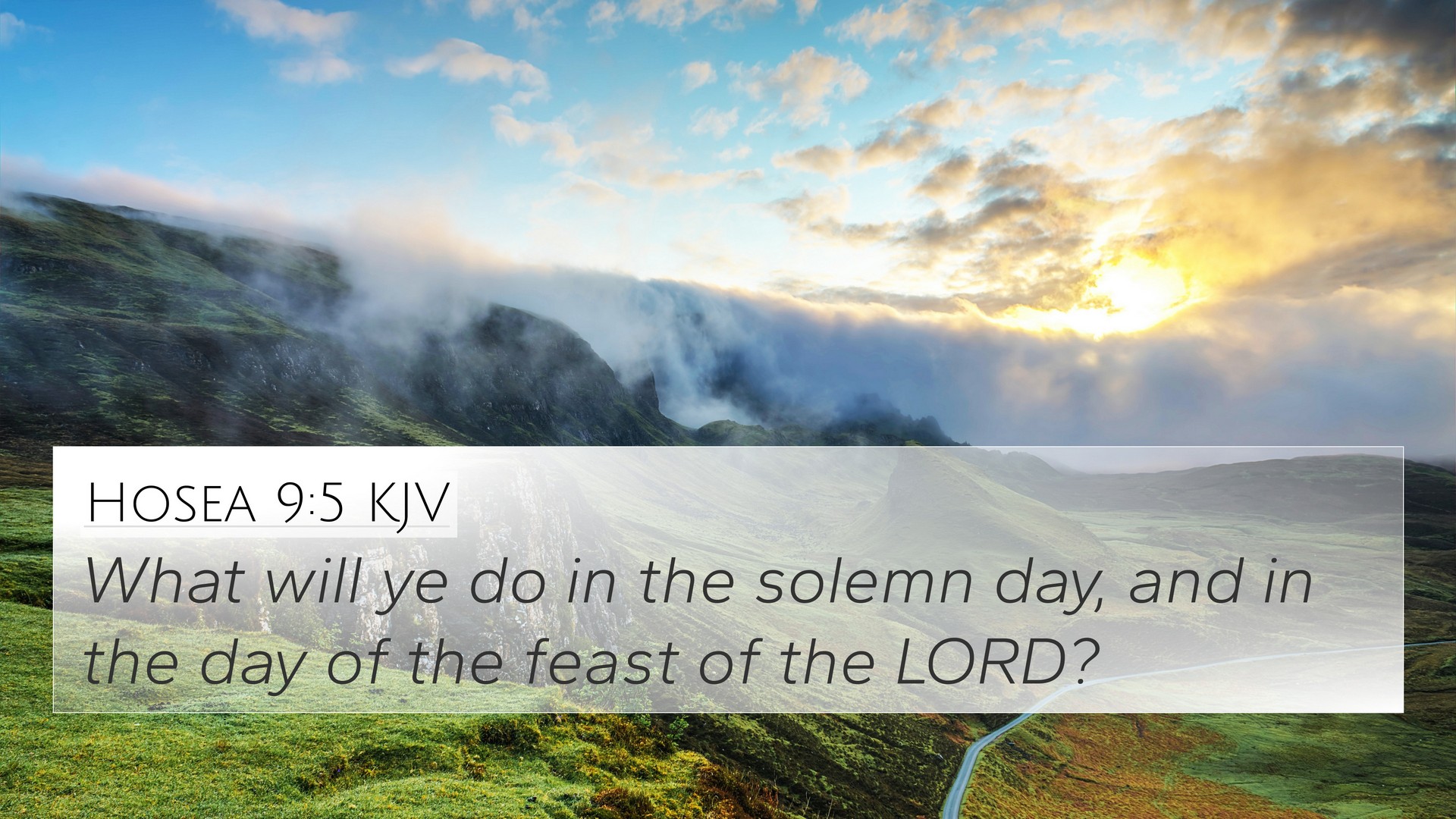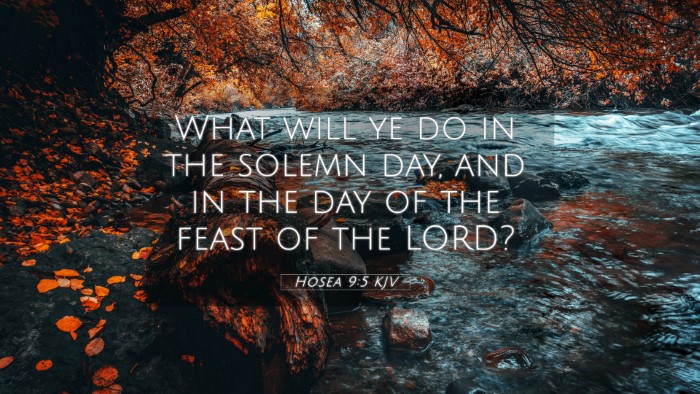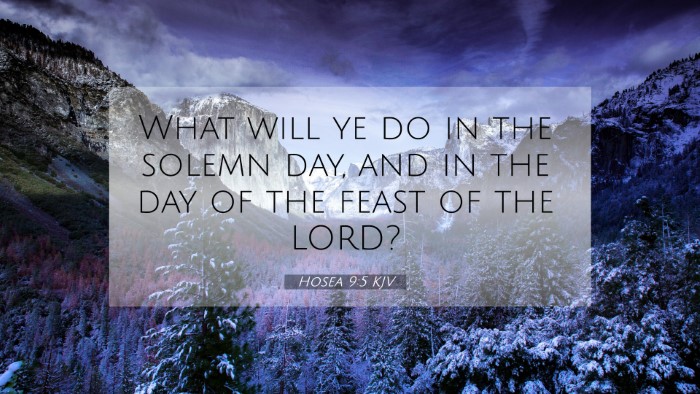Old Testament
Genesis Exodus Leviticus Numbers Deuteronomy Joshua Judges Ruth 1 Samuel 2 Samuel 1 Kings 2 Kings 1 Chronicles 2 Chronicles Ezra Nehemiah Esther Job Psalms Proverbs Ecclesiastes Song of Solomon Isaiah Jeremiah Lamentations Ezekiel Daniel Hosea Joel Amos Obadiah Jonah Micah Nahum Habakkuk Zephaniah Haggai Zechariah MalachiHosea 9:5 Similar Verses
Hosea 9:5 Cross References
What will ye do in the solemn day, and in the day of the feast of the LORD?
Uncover the Rich Themes and Topics of This Bible Verse
Listed below are the Bible themes associated with Hosea 9:5. We invite you to explore each theme to gain deeper insights into the Scriptures.
Hosea 9:5 Cross Reference Verses
This section features a detailed cross-reference designed to enrich your understanding of the Scriptures. Below, you will find carefully selected verses that echo the themes and teachings related to Hosea 9:5 KJV. Click on any image to explore detailed analyses of related Bible verses and uncover deeper theological insights.
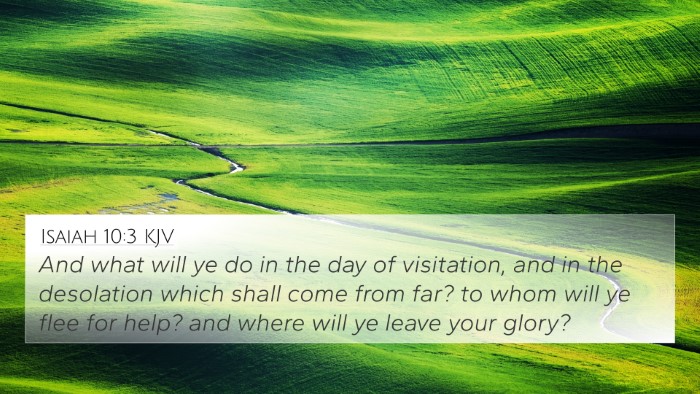
Isaiah 10:3 (KJV) »
And what will ye do in the day of visitation, and in the desolation which shall come from far? to whom will ye flee for help? and where will ye leave your glory?
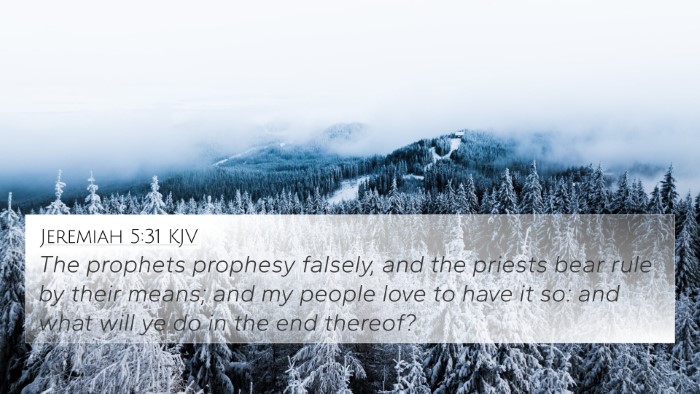
Jeremiah 5:31 (KJV) »
The prophets prophesy falsely, and the priests bear rule by their means; and my people love to have it so: and what will ye do in the end thereof?
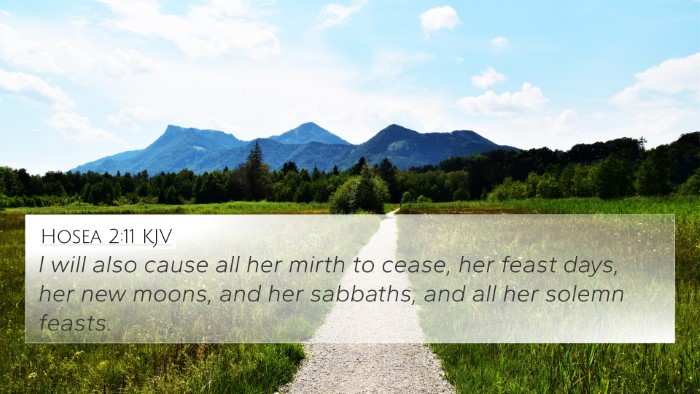
Hosea 2:11 (KJV) »
I will also cause all her mirth to cease, her feast days, her new moons, and her sabbaths, and all her solemn feasts.
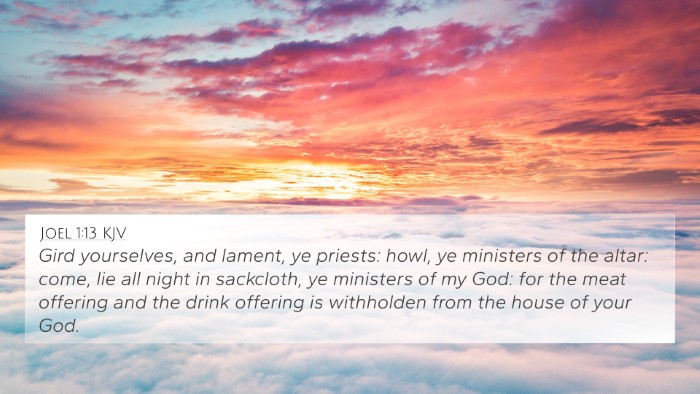
Joel 1:13 (KJV) »
Gird yourselves, and lament, ye priests: howl, ye ministers of the altar: come, lie all night in sackcloth, ye ministers of my God: for the meat offering and the drink offering is withholden from the house of your God.
Hosea 9:5 Verse Analysis and Similar Verses
Bible Verse Meaning Summary: Hosea 9:5
Hosea 9:5 states, "What will you do on the day of your appointed festival, on the feast days of the Lord?" This verse expresses a deep concern for the people of Israel and their impending judgment due to their unfaithfulness to God. Several public domain commentaries elucidate its meaning, offering rich insights.
Context and Historical Background
The Book of Hosea is primarily focused on the theme of God's love amidst Israel's unfaithfulness. Hosea's prophetic messages reflect the moral decay and rebellion of Israel against their covenant with the Lord. The appointed festivals mentioned in this verse refer to sacred occasions meant for worship and remembrance of God's grace, which the people were neglecting due to their sinful practices.
Insights from Commentaries
Combining insights from various public domain commentaries gives us a multifaceted view of Hosea 9:5.
- Matthew Henry: Henry emphasizes the futility of Israel's religious observances when they are marred by sin. He notes that these festivals would be meaningless in light of their judgment, highlighting the necessity of sincerity in worship.
- Albert Barnes: Barnes explains that the question posed in the verse implies the consequence of Israel's actions. He suggests that the people will find themselves unprepared for worship during their feasts due to the impending calamity, representing a spiritual void.
- Adam Clarke: Clarke interprets the "appointed festival" as a direct reference to the feast of tabernacles or other major feasts that would remind the Jews of their covenant with God. His commentary indicates that, at that time, Israel was more involved in idolatry than in true worship.
Thematic Connections
In exploring the themes of Hosea 9:5, we discover connections to other Bible verses that emphasize the importance of true worship and the consequences of abandoning God. Below are several themes and related verses:
- Judgment for Idolatry: Amos 8:10 - "I will turn your feasts into mourning." This verse parallels Hosea’s warning about empty religious observance.
- Consequences of Sin: Ezekiel 18:30 - "Repent and turn from all your offenses." This highlights the need for sincerity in faith aligned with God's expectations.
- True Worship: John 4:24 - "God is spirit, and his worshipers must worship in the Spirit and in truth." This reaffirms the necessity of genuine worship contrasted against Israel's practices.
- Neglect of Sacred Times: Isaiah 1:13 - "Bring no more vain offerings." This reflects a similar sentiment of God rejecting false worship.
- Calls to Repentance: Joel 2:12 - "Return to me with all your heart." This directs Israel back to God, which they are neglecting at the time of Hosea's prophecy.
- Spiritual Complacency: Micah 6:6-8 - Demonstrating what God desires: "To act justly and to love mercy," highlighting the need for actions aligning with worship.
- Futility of Religious Rituals: Matthew 15:9 - "They worship me in vain; their teachings are merely human rules." This reflects the same concern expressed by Hosea regarding meaningless rituals.
Cross-Referencing Insights
The understanding of Hosea 9:5 can also benefit from inter-Biblical dialogue through cross-referencing related verses. The following is a list of thematic Bible verse connections that reinforce the message of this verse:
- Unfaithfulness and Judgment: Proverbs 1:24-26 correlates to the disregard for wisdom and the eventual judgment that ensues from it.
- Warning Against False Comforts: Jeremiah 14:10-12 proclaims similar themes of false security during times of judgment.
- God's Call for Renewal: Zephaniah 2:1-3 urges gathering together and seeking righteousness, emphasizing the hope for genuine return to God.
- Asking for Forgiveness: 1 John 1:9 reinforces the need for confession and true repentance as per God's standards for worship.
- The Nature of God's Festivals: Exodus 23:14-17 outlines the purpose of festival observances, linking back to their significance in maintaining a covenant relationship.
- Worship in Spirit and Truth: Hebrews 10:22 stresses a sincere approach to God that aligns well with the call of Hosea.
Concluding Thoughts
Hosea 9:5 serves as a poignant reminder of the spiritual state of Israel and the dire consequences of their unfaithfulness and superficial worship. The insights from the commentaries, combined with the web of connections to other scriptural passages, enrich our understanding of the call for true fidelity to God. Engaging in cross-referencing allows believers to gain a deeper insight into the broader biblical narrative that encourages genuine worship and lays bare the dangers of neglecting the intended fullness of worship in the face of impending judgment.
